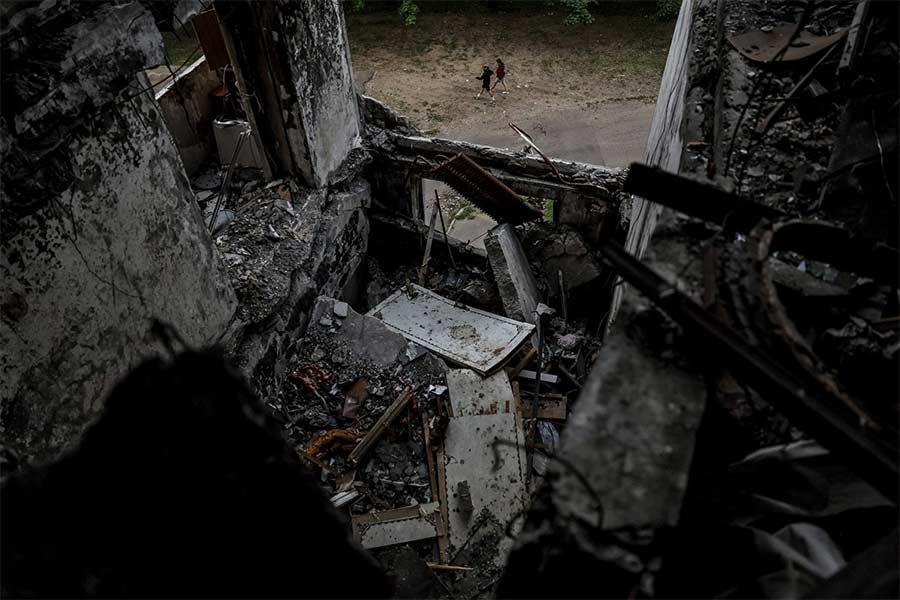The €50 billion Ukraine reconstruction fund discussed by EU lawmakers this week should not only be used to rebuild the country but also to build back better with the European Parliament and the EU Council on equal footing to oversee its use, writes Valeriya Izhyk.
Valeriya Izhyk is EU Policy Officer on Ukraine Reconstruction at CEE Bankwatch, a member of the biggest Ukrainian environmental NGO “Ecoaction”, based in Brussels.
Even in the toughest times, the European Parliament remains a forum where everyone can be heard, and Ukrainian civil society is no exception.
Experts’ insight and knowledge from on the ground, as well as watchdogs’ experience in addressing issues in Ukraine, can be a powerful tool for MEPs to spin the dynamics of the Ukraine Facility.
Setting ambitious objectives
As it stands, the draft facility regulation mentions key European framework commitments, such as the Green Deal and the Paris Agreement, but it tiptoes around the issue of conditionality for money disbursement.
A simple nod to Europe’s greening commitments is not enough. If we want to prepare Ukraine to join the European Union, we have to ensure they’re ready to play by the rules. The Regulation shouldn’t nudge Ukraine to do the right thing, it should instead set ambitious objectives that get the ball rolling on the implementation of EU acquis.
This has been a major concern for Ukraine’s green watchdogs, who, until recently, were in the shadow of their anti-corruption colleagues. Environmental governance mismanagement does not tend to jump out as much as corruption scandals do, nor do they attract Brussels’ wrath in the same way.
The environmental damage Russia has inflicted on Ukraine, in particular through the destruction of the Kakhovka dam, and the need to protect the environment going forward, has also attracted the attention of policymakers in Brussels. VOLT MEP, Damian Boeselager, highlighted the importance of the often-overlooked greening of Ukraine, winning the hearts of Ukrainian environmentalist CSOs.
War and reform in parallel
In the midst of Russia’s brutal war of aggression, it comes as a shock to many that discussions on the environment can even take place. Yet, fighting the war and reforming the country simultaneously is exactly what the EU is asking of Ukraine.
Good environmental protection measures can hardly be introduced into Ukraine’s legislation overnight, and even more importantly – bear fruit for Ukraine’s citizens. Hence, we should carefully and pragmatically prioritize the implementation of acquis that is achievable for Ukraine in the short term in view of Ukraine becoming an EU member state.
Mr Boeselager proposed MEPs should take the Recovery and Resilience Fund (RRF) as an example when preparing the Ukraine Facility. The RRF was aimed to help Europe bounce back from the COVID pandemic, keeping the pre-crisis green and digital transitions in focus while sprinkling in some conditionality to encourage reforms in member-states.
The reconstruction fund is similar in that it also serves multiple purposes. In the short term, it provides much-needed support for Ukraine’s public services. In the mid-term, it will fund Ukraine’s reconstruction, and in the long term, it should clear the path for EU accession. With this in mind, the “Environmental” and “Energy” Chapters of the EU’s acquis communautaire are a great place to start, as reduced energy bills, clean water, air, and soil will massively benefit Ukrainian Citizens.
There is also a tangible political and economic argument for conditionality and a focus on these chapters of the acquis communautaire. If we rebuild destroyed houses in line with the Energy Efficiency Directive, we will be simultaneously preparing Ukraine for accession while putting roofs over people’s heads.
Restoring damaged and destroyed factories and manufacturing plants to EU risk-management and pollution-limitation standards will benefit Ukraine’s industrial base, by preparing them to meet EU standards, and its citizens, by guaranteeing them a safer environment.
However, these chapters are challenging both for Ukraine’s government and its companies, with issues ranging from energy efficiency to water and air quality, to waste management, nature protection, limits on industrial pollution, chemicals and genetically modified organisms, noise and forestry.
The benefits are not necessarily transactional, and so CSOs, and hopefully the European Parliament, will need to push the Ukrainian Government to take this approach, along with consultation with, and feedback from the civil society, as per the European Code of Conduct on the Partnership Principle.
Earmarking at least 25 % of grants and loans to Ukraine for climate and environment, and setting out strong conditionality, with a ‘do no significant harm’ principle, net-zero by 2050 goal, and targets for implanting acquis to unlock funds, will be vital to accelerate reforms needed for EU accession, recovery, reconstruction, greening, and modernisation.
The ability of Ukraine to fight a full-scale war while continuing to pursue a transformational reform agenda has turned many heads in Brussels. However, policymakers need to realize the impact that the Ukraine Facility will have on the country’s policies. It has the power either to derail Ukraine’s reform agenda, by pouring money into the country without the necessary safeguards and targets; or to accelerate it, further shaping Ukraine into a modern, green European Democracy. It will be for European lawmakers to decide which.
By Valeriya Izhyk
Source: euractiv.com

